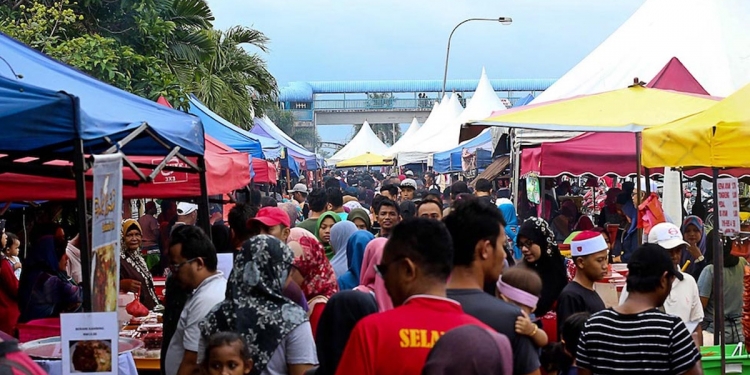To curb the spread of COVID-19, Malaysian authorities have implemented a Movement Control Order that is set to lift after the 14th of April. And with the start of Ramadan month just around the corner, authorities are reportedly considering a revised format—or outright cancellation—for the annual bazaars that are traditionally organised across the nation over the fasting month.
Despite earlier reports indicating that the bazaars wouldn’t be cancelled within the constituency, Federal Territories Minister Tan Sri Annuar Musa has clarified over Twitter that a final decision has not been made at this juncture. Instead, guidance from local authorities, along with the Ministry of Health (MOH) and the National Security Council (NSC), is still required to come to a suitable conclusion.
WE MUST TAKE NOTE OF THIS..WE HAVE NOT MAKE A DECISION..LET PBT STUDY N COME UP WITH RECOMMENDATIONS Malaysiakini – Ramadan bazaars still possible if MOH guidelines followed – DG @MIUI| https://t.co/BGkxg6214W
— Annuar Musa (@AnnuarMusa) April 1, 2020
A revised format?
Earlier, the minister had said that the cancellation of similar bazaars in Singapore does not mean that identical measures will be taken in Malaysia, suggesting that an adjusted format might be the best compromise.
“We have to think of the need of rural folks who do not have the time to cook after returning from work. I want this matter to be looked at as previous Ramadhan bazaars were usually big and spread out, and we probably cannot do the same [this year].”
A possible alternative could involve a limited number of vendors, with Ramadan bazaars usually organised with up to 50 stalls. This would mean bazaars of only 10 stalls, set up far apart to ensure that social distancing continues to be practised.
Despite the fact that the MCO will be lifted by then (tentatively speaking for now), Musa says that this self-discipline is necessary even after Malaysians begin to resume normalcy post-MCO.
Do Malaysians want Ramadan bazaars in this climate?
Malaysians’ reception to the news has been mixed, at best. Users on social media argued that the bazaars would come at the wrong time—a time when Malaysians are “fighting” the virus. A user added that Malaysians will still fast, and will still break their fast appropriately, even without Ramadan bazaars. Food delivery services are still available through the MCO, while supermarkets are still open for limited hours as well.
@AnnuarMusa @MuhyiddinYassin @DrAdhamBaba @DGHisham
— K³ (@Kh0ngK3kKw4t) March 31, 2020
Is this a good idea?
No one's gonna die by not going to the Bazaar Ramadhan.
People will still fast. And people will still break their fast when the time comes.We don't want RMO extension & WE DON'T WANT TO BE THE ASIAN ITALY!
Some Malaysians also voiced their worry at bazaars being held in the Federal Territories due to the density of the population in the region:
RAMADAN BAZAAR allowed in Federal Territories? In those populated places. What a dangerous and moronic decision! -ar
— azly rahman (@azlyrahman) April 1, 2020
Would it be wise?
While it might be an entirely fair point that the livelihoods of stall owners are at stake, ultimately, the advice of health professionals should be heeded. The Health Director-General Datuk Seri Dr Noor Hisham Abdullah said that if bazaars are to be held during Ramadan month, proper contact distancing measures are essential.
“We need to practise the current standard operating procedures and guidelines. More importantly is to take all precautionary measured to break the chain of Covid-19 infections.”
As time time of writing, several state authorities in Malaysia have already announced that Ramadan bazaars will be cancelled this year, including Melaka and Negeri Sembilan; Penang is also considering cancellations.
The Health DG revealed earlier that a decision on another possible MCO extension has not been made.
“We will only know after the first week of April.”
If the MCO is extended, it’s safe to assume that all Ramadan bazaars will be cancelled—in all states and territories.
[ SOURCE , 2 , 3 , IMAGE SOURCE ]








